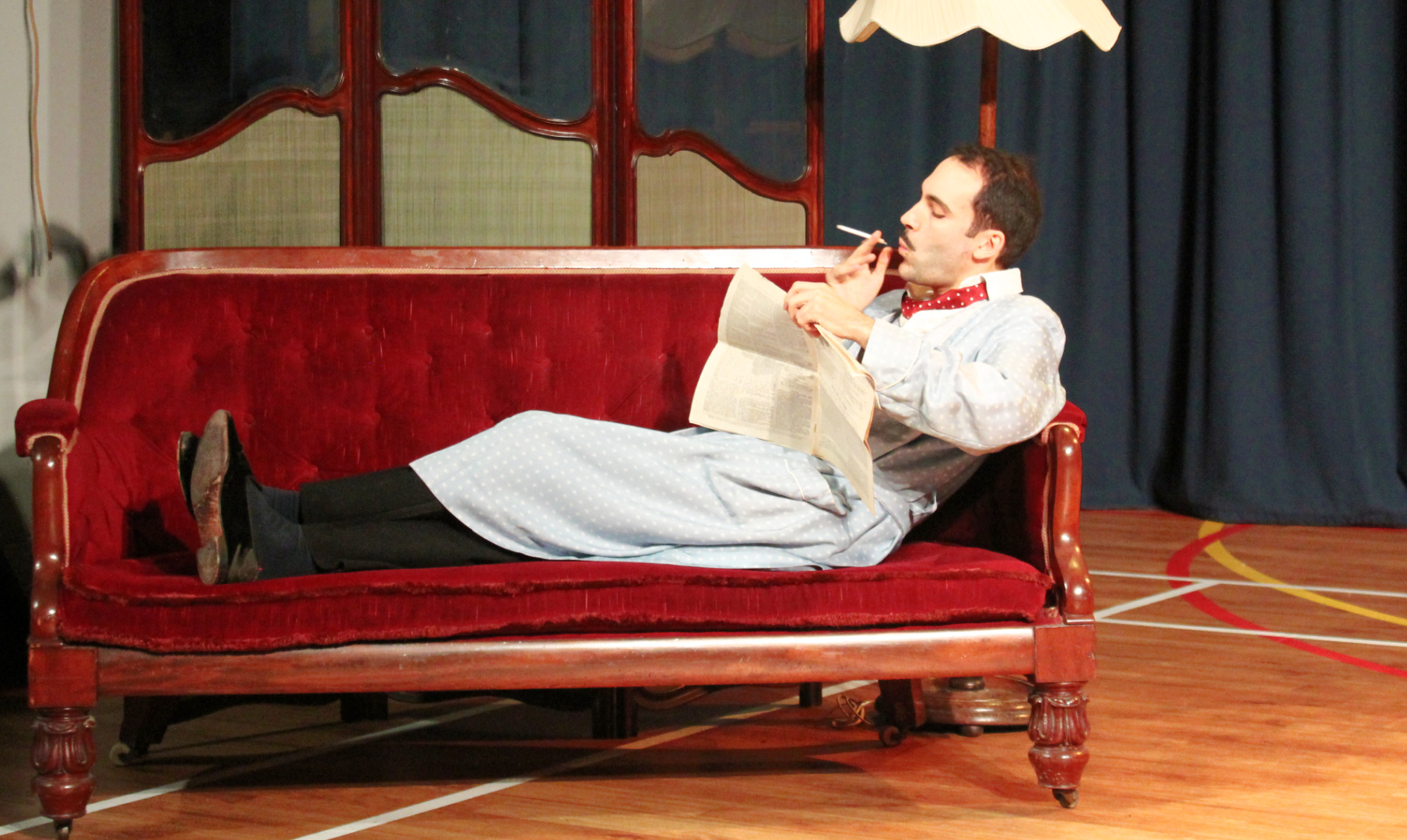
We are just recovering from the village play. This annual Christmas event was taken over last year by our son William, who writes it and acts in it, and his wife Hannah, who directs. Last year, it subverted the genre (as critics like to put it) of ghost stories. This year, it did a similar trick with whodunnits. It was entitled Death on the Dudwell, a reference to the trickle of a tributary which runs beside our fields. The play, set in 1935, opens with the idle would-be heir Arthur Prince (William) reading a contemporaneous Spectator on a sofa. It concerns the murder of his father, the unsavoury Lord Haremere (played by William’s former prep-school head, David Chaplin) who, though already dead before the play starts, has a good many lines. Almost every member of the cast has a motive for killing the old wretch. Since David still had Covid last week, there was very real pressure from typecasters that I would have to step in and read out Lord Haremere’s lines on stage. Luckily David rallied, and the performances (two nights, by popular demand) were a great success. All the cast of 23 were local, the great majority from the village. The character names suggest the style – Miss De Meener, Charity Frost, Gabby Gobb (the parish news reporter). The (real) rector brilliantly managed the sound effects, including the noise of fist connecting with face. The plot was ingenious, as proved by the fact that the audience on opening night, when invited to guess in a secret ballot during the interval who done it, all got it wrong.
Many of the laughs came, of course, from the play being place- and sometimes even person-specific. One might have thought that jokes about Etchingham’s Bistro at the station, the shortcomings of Southeastern Railway and the misfortune of coming from the next county (Kent) would have been untransferable. But this turns out not really to be so. Someone in the much larger parish of Stockbridge in Hampshire got to hear of the show, and William has sold him the rights for £100, payable, like all our ticket proceeds, to our parish church. The Stockbridge version is called Terror on the Test. With the local gags easily tweaked to the situation and personalities of each village, the play can be a template for any English country parish where people like laughing at Christmas. There must still be a few of those.
As we all prepare to get festive, my brave friend Rose Cecil is in eastern Ukraine. Not content solely with delivering field ambulances to the front for MissionUkraine.uk (which is dangerous enough), Rose has also been driving some of the ambulances in action, evacuating the wounded. Although she is usually a joyful person, in recent weeks her messages have grown more sombre. She admits this is partly attributable to the bitter cold which ensues when Russian bombing cuts off all power; but it is more. She repeats soldiers’ reports near Pokrovske – the road to the south-west ‘is already the road of death’ and villages on the other road are gradually being captured. ‘I hate to admit this, but I don’t want to be here any more. It’s not that I’m homesick, or that I want to be somewhere else… I just feel I’ve reached the end of the road.’ Later she corrects that: it is not yet the end of the road. But ‘the road is narrowing and the options are fewer’. ‘Everyone here is hanging on for Trump. It’s not that they have expectations. It’s more that it sets a point in the future in the otherwise dreary sameness.’ Then Rose sends a picture of herself in camouflage and bulletproof gear, with the message ‘Off to work! Dad’s Army basically’ followed by the emoji for ‘roll on the floor laughing’.
Sir Keir Starmer emanates a lack of personality, people say – if a lack of something can be said to emanate. I think the problem is a different one. Sir Keir has a strong personality, a rigid self-belief, so strong, perhaps, that it leaves little room for others. After he caused the portrait of Lady Thatcher to be removed from the study at 10 Downing Street, he explained that it was nothing personal, only part of his general dislike of having pictures of other people looking down at him. Luckily, our head of state is different from our head of government. In his updated biography of the King, Charles III, Robert Hardman mentions HM’s Wall of Worthies. This is an array of busts perched on the drystone wall of his garden at Highgrove. They depict heroes whom the King has known and admired, some now dead, some living – including the composer Sir John Tavener, the poet Kathleen Raine, Debo Devonshire, Mollie Salisbury, Miriam Rothschild, Bishop Richard Chartres, Vandana Shiva (‘the Gandhi of Grain’) and Tigga, his Jack Russell. It is an attractive human characteristic, especially in a leader, to find greatness in others and celebrate them. Sir Keir doesn’t seem to celebrate anything.
Buzzword of 2024 to be banished in 2025 is ‘reimagine’. ‘Pivotal to our Reimagine Strategy is the House of Brands,’ burbles Jaguar; it intends ‘to build truly emotional experiences for our clients’. The National Portrait Gallery reimagined its collection, ‘focused on increasing representation’; the British Museum is reimagining its Western Range; the Horniman Museum has ‘reimagined museum spaces’. The Tony Blair Institute for Global Change is ‘Reimagining government for the 21st century’. The Globe Theatre’s bookshop offers ‘Shakespeare Reimagined’. Clandon Park burnt down under the ownership of the National Trust, and now the Trust has commissioned architects to reimagine it rather than restore it. Enough! Such reimaginations all point in the same ideological direction, which suggests they are not imaginative at all.
I am sure that Pope Francis had good reason not to attend the reopening of Notre-Dame Cathedral. He is an old man, and not well. Still, I am sad. When the Christian West shows rare signs of rebirth, it should have his fullest blessing.









Comments